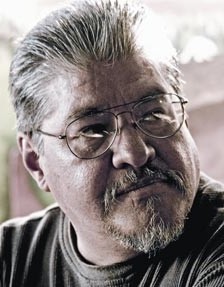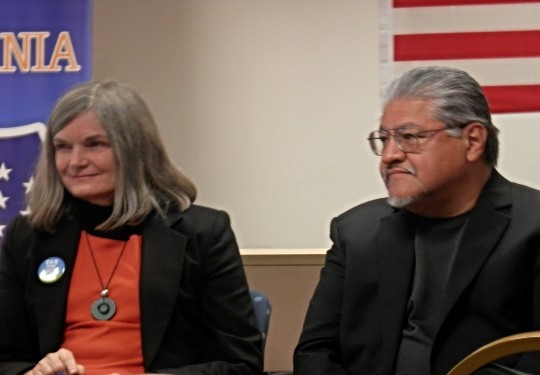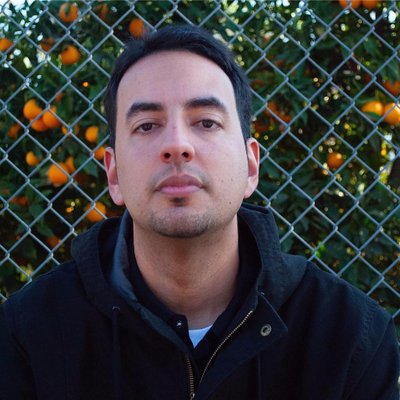
Twenty years ago, Luis J. Rodriguez wrote Always Running, the legendary memoir chronicling his transformation from cholo to Chicano activist. Now the author of fifteen books is looking to transform the state of California with a grassroots bid for the Governor's office–because if Norman Mailer could run for office, why can't he? An independent candidate endorsed by the Green Party, Rodriguez's platform tackles issues of poverty, the prison system, the environment and single payer healthcare for all.
He honed that message at an open candidate forum hosted by LULAC in Garden Grove on Sunday with Greens Laura Wells and Ellen Brown, who are running for Controller and Treasurer respectively.
]
Rodriguez is currently on a statewide tour to collect 20,000 signatures for ballot placement in 2014. Before heading off to another stop, the Weekly spoke with Luis Rodriguez about his campaign.
OC Weekly (Gabriel San Román): What motivated you to run for governor this year?
Rodriguez: Like most people, you get tired. I think we put a lot of effort behind Governor Jerry Brown thinking he would be the guy that would save the state and it's just not working. The Democrats and Republicans for the most part just do not represent the interests of the homeowner, the poor guy working, anybody trying to survive. The idea is that I'm part of this world. I want to contribute in a meaningful way. I thought I could do it with my voice, my books, my writing, and now by running for governor, a very important position, bringing in vital, new ideas. My slogan is 'Imagine a New California.' That's the first step.
You harshly criticize Governor Brown's recent budget proposal. What do people need to be aware of in terms of it and what alternatives do you offer?
It was pretty much balanced on the backs of poor people, cutting back CalWorks, cutting back CalFresh, cutting back arts programing, cutting back all these things I think are vital to keep communities alive. What I would do is turn it all around. Imagine every community clean, green, where everybody has healthcare and education access, where everybody's got decent homes. Imagine a California in which every neighborhood is alive with arts, festivals, music, dance. Imagine what your community should look like and say every neighborhood should be that way. The budget should not be balanced off the backs of poor people, but it should be allowed so that all the wealth in state–which is very massive, we're the eighth largest economy in the world, the largest economy in the United States–should help create that situation for everybody to live decently.
In the summer of 2012, Anaheim became the media epicenter for issues of police brutality. This past year, there was the controversial shooting of 13-year-old Andy Lopez by a Sonoma County Sheriff Deputy. What are your thoughts on police brutality as a statewide issue?
Every police department needs to be overseen by the public. Whatever you want to call it, community control is vital. They've got to work for us. They're separate from us. They can kill a 13-year-old kid like Andy Lopez for no reason and pretty much get away with it. We have to change that. This is what happened in Anaheim and all these communities where people are being killed, officers are being exonerated, and things are not changing. I think we have to say every police station has to be controlled by the community, not by politicians or by themselves. For example, the Los Angeles Police Department has a billion dollar budget. They're not putting money in restorative justice. They're not putting money in treatment or jobs training. The police are getting bigger and the budgets are getting bigger. The prison system has become massive. It's the largest in the world outside the federal system. This is not a state I want to be a part of.
[

As founder of Tia Chucha's Centro Cultural & Bookstore in Sylmar and with your work as an author and poet, what is your vision for arts and culture in a new California?
I will fight for a neighborhood arts policy. For example, in LA, almost all the arts are concentrated in museum row, tourist Hollywood and well-off neighborhoods. When you go to the poorest neighborhoods–South Central, East LA, the Harbor, Northeast Valley–there's no bookstores, no movie houses. Not even in the entertainment capital of the world can we go to the movies there. There's no art galleries, no festivals, nothing is going on. People are culturally barren. So I say every neighborhood should be alive: movies, theater, dance, signing, music, murals everywhere! I'm serious. That makes a community feel like human beings live there and are thriving. That's a neighborhood arts policy where the money isn't concentrated in just a few people but sent out everywhere.
In terms of immigration, important legislation was brokered like the Trust Act and driver's licenses for the undocumented. There is a movement and traction. What else would you add to that conversation policy wise?
Obviously, I would support anything that gives rights and access to any immigrant community. Governor Brown signed such legislation. All power to him for that. The only thing I have to say is that almost all of that was done under pressure from the community. It was done after many years of fights, many years of people vetoing these kinds of bills. Finally, they got enough people to do a few of these things. But like what they always do, it's never enough. We've got to make it so that every person who lives here, whether they've got papers or not, feels like they are a part of the state, contributing to the state and should be able to benefit from being in the state.
The past Green Party governor candidate Laura Wells wasn't able to participate in the debates. Only with the recall election last decade did people really get to hear the ideas of the late Green Party governor candidate Peter Camejo. With that, how do you plan to engage with a political system that is structured to shut your message out?
That in itself is an issue. Is this a democracy where money talks, where only two parties speak, where the media only concerns itself with the big money candidates? I think people have got to be mad and want more voices. Part of my campaign is to say at least sign our petitions to get me in there, to have more voices, and have equal access. All elections should be funded publicly so that it's not dependent on any corporations putting money behind all this. We need to have as many voices as possible. That, to me, is part of the democratic process. Believe it or not, some people are open to this now. This is why this campaign has resonance. Now people are tired. We gave it to the Democrats. We had the Republicans run the state. Look at how it's gone. Now, let's open it up to new, vital energy that comes from the communities and have as many voices as we can in those issues and in this process.
Lastly, you've written books of poetry. If you're able to take the governor's office, who would your poet laureate be?
Here's what I would say: We would work so that everybody could be a poet. That means every community would have opens mics and poetry slams. I would invite a whole mass of young people. If I would have an inauguration, I would have drumming, poetry, music and dance. I would say not just one poet, I would have all these young people get up and do poetry. It's the kind of thing that brings people more life when their language, ideas and voice get out there. I would make it so that every neighborhood is alive with poetry.
To learn more about Luis J. Rodriguez's campaign, visit www.rodriguezforgovernor.org.
Follow Gabriel San Román on Twitter @dpalabraz
Follow OC Weekly on Twitter@ocweekly or on Facebook!

Gabriel San Román is from Anacrime. He’s a journalist, subversive historian and the tallest Mexican in OC. He also once stood falsely accused of writing articles on Turkish politics in exchange for free food from DönerG’s!

